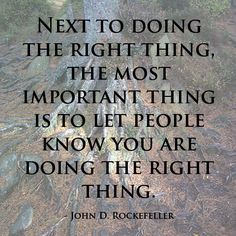5 Great Quotes About Business
 A bit of advice is always handy when embarking on a new business venture, and business leaders are seldom shy when it comes to sharing their wisdom. We’ve scoured the Internet for the top five powerful quotes about business — quotes that can help to ensure your success in any field. As you read, take a moment to absorb these business quotes and consider how they might apply to you.
A bit of advice is always handy when embarking on a new business venture, and business leaders are seldom shy when it comes to sharing their wisdom. We’ve scoured the Internet for the top five powerful quotes about business — quotes that can help to ensure your success in any field. As you read, take a moment to absorb these business quotes and consider how they might apply to you.
Steve Jobs
“[Focus] means saying no to the hundred other good ideas that there are.” (Source)
By the time of his death in 2011, Steve Jobs had become a legend by orchestrating one of the most dramatic recoveries in the history of American business. When Jobs regained control of Apple in 1997, the company was so desperate for operating capital that it needed an investment from longtime rival Microsoft just to stay afloat. Jobs returned Apple to profitability — eventually making it the world’s most valuable public corporation — by paring down the company’s overgrown and confusing product selection and approving only the most compelling new products.
Lee Iacocca
“If you can find a better car, buy it.” (Source)
Faced with fuel shortages in the 1970s, American consumers abandoned large domestic cars en masse in favor of smaller and more fuel-efficient cars imported from Japan. Faced with mounting financial problems, Chrysler used a loan from the United States government to develop the “K-car” platform. The K-car platform allowed for the production of more fuel-efficient cars ranging from two-door convertibles to four-door limousines. Chrysler chief executive Lee Iacocca took to the airwaves to promote the K-car platform, telling consumers to buy a better car if they could find it. The campaign worked; Chrysler repaid the government loan seven years early.
Henry Ford
“If I had asked people what they wanted, they would have said ‘faster horses.’” (Source)
In the history of American business, the most disruptive companies have been those that created completely new product categories. Some of the most prominent disruptive products of the past century include the mass-produced automobile, the personal computer and the smartphone. Relying exclusively on customer feedback can help a company improve its existing products. However, a customer can’t tell you about the next big thing because it hasn’t been invented yet.
John D. Rockefeller
“Next to doing the right thing, the most important thing is to let people know you are doing the right thing.” (Source)
People feel good when they buy from a company with a positive public image. However, cultivating a positive public image can be costly. It isn’t inexpensive to do things such as manufacture goods in an environmentally friendly way or pay workers fair wages. Doing the right thing, however, can encourage conscious consumers to buy from you rather than your competition. Having a good public relations engine in place can help to guarantee that making the right decisions will pay off in the end.
Bill Gates
“Success is a lousy teacher. It seduces smart people into thinking they can’t lose.” (Source)
In business, you’ll learn very little from the things that you do right. With repeated success, you may even fail to notice the signs that your target market is evolving and leaving you behind. Bill Gates was wise not to make that mistake when IBM requested an operating system from Microsoft for its upcoming IBM PC in 1980. Although software products such as programming language compilers had already made Microsoft a successful company, Microsoft didn’t have an operating system to sell to IBM. Bill Gates was wise enough to see that his customer base was about to change, and Microsoft scrambled to acquire the code base for an operating system. If Gates had been seduced by his company’s success into thinking that Microsoft’s primary customer base would always be programmers and software hobbyists, Microsoft might not still exist today.
Conclusion
In the end, what are the most important things that we can learn from some of history’s most important business leaders? From Steve Jobs and Henry Ford, we’ve learned that successful business leaders say “no” more often than they say “yes.” We’ve also learned that sometimes, customers don’t truly know what they want because it hasn’t been invented yet. From Bill Gates, we’ve learned the importance of staying on one’s toes because past success isn’t a predictor of future success. From Lee Iacocca and John D. Rockefeller, we’ve learned that the message your company presents to the public is nearly as important as the products it sells. Regardless of where your future ventures may take you, the key is to never stop learning.


